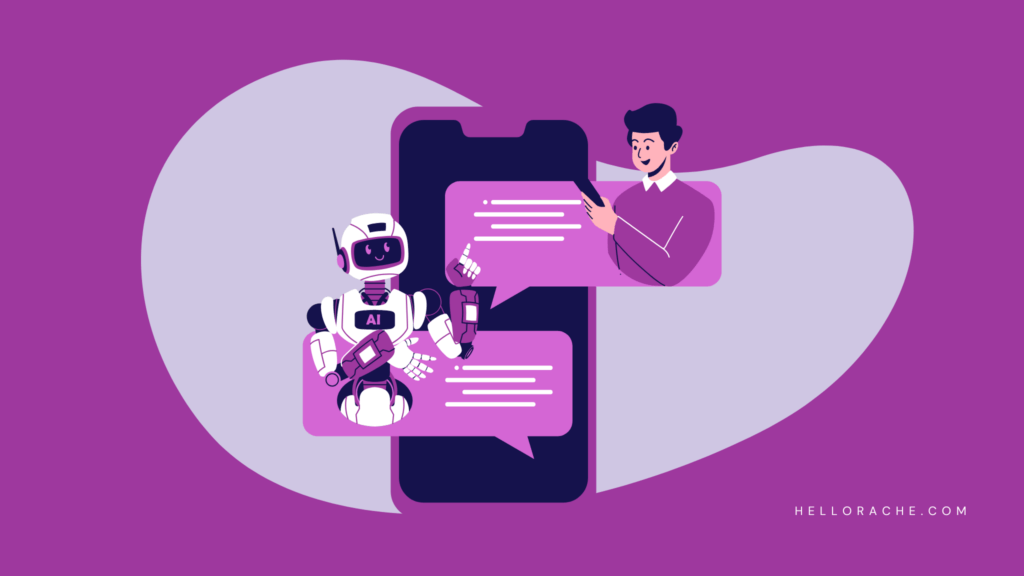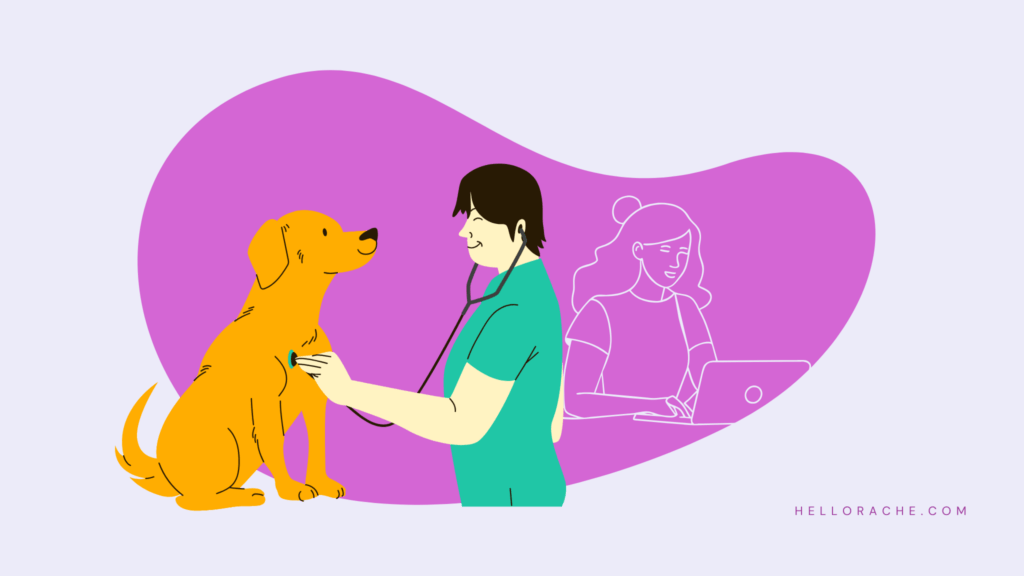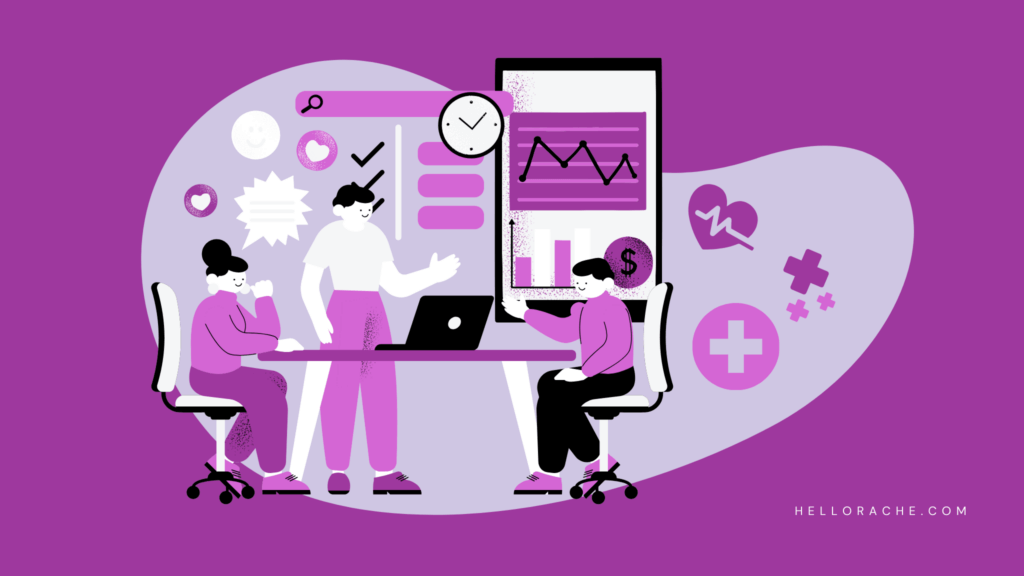In today’s fast-evolving healthcare landscape, automation is gaining momentum and helping organizations run more efficiently. Healthcare providers are increasingly exploring AI-driven chatbots to streamline administrative and patient-facing tasks. The appeal is clear - automation offers significant cost savings which can seriously improve a healthcare practice’s bottom line. Better yet, there’s the added bonuses of 24/7 availability and quick response times. However, if you look closely at chatbots vs human virtual assistants, the real thing is superior.
Chatbots, of course, can handle simple, repetitive duties, but they fall short in areas where empathy, critical thinking, and adaptability are needed. Human virtual assistants, however, have emotional capacity, adaptable problem solving skills, and the ability to personalize patient care. At present, AI simply cannot replicate the human touch - this is why it falls short in many crucial areas and has the potential to damage your business.
Hello Rache works on a day-to-day basis with virtual assistants and we’re perfectly placed to tell you about the many differences when it comes to chatbots vs human virtual assistants.
The Rise of Chatbots in Healthcare
As part of the broader trend towards digital transformation, it’s no surprise that the healthcare industry has readily adopted chatbots into their daily operations. With the rise of telehealth, virtual care, and remote patient monitoring, AI-powered solutions are generating headlines and becoming increasingly common in practices. In particular, healthcare practices use chatbots to perform the following administrative and clinical duties:
Appointment Scheduling
Automated bots can connect directly to booking systems to cancel and reschedule appointments without direct human intervention. All a patient has to do is send a series of responses to automated questions and AI does the rest.
Symptom Checking and Triage
All patients need some form of triage when they visit a healthcare setting, but this can be time-consuming for doctors who are already drowning in paperwork. Chatbots, therefore, can step in and assist with preliminary assessments by asking patients a series of standardized questions and forwarding them to the clinician.
Prescription Refill Requests
Chatbots enable patients to conveniently request medication refills online, streamlining the process and minimizing the workload for front-desk staff. This automation enhances efficiency, reduces phone call volume, and allows clinical staff to focus on more complex patient needs.
Answering FAQs
Many inquiries into a healthcare practice will be the same, and this can be draining for your staff to regularly serve up the same answers. Luckily, chatbots are built to handle repetitive and monotonous tasks such as providing details on office hours, insurance details, and service availability.
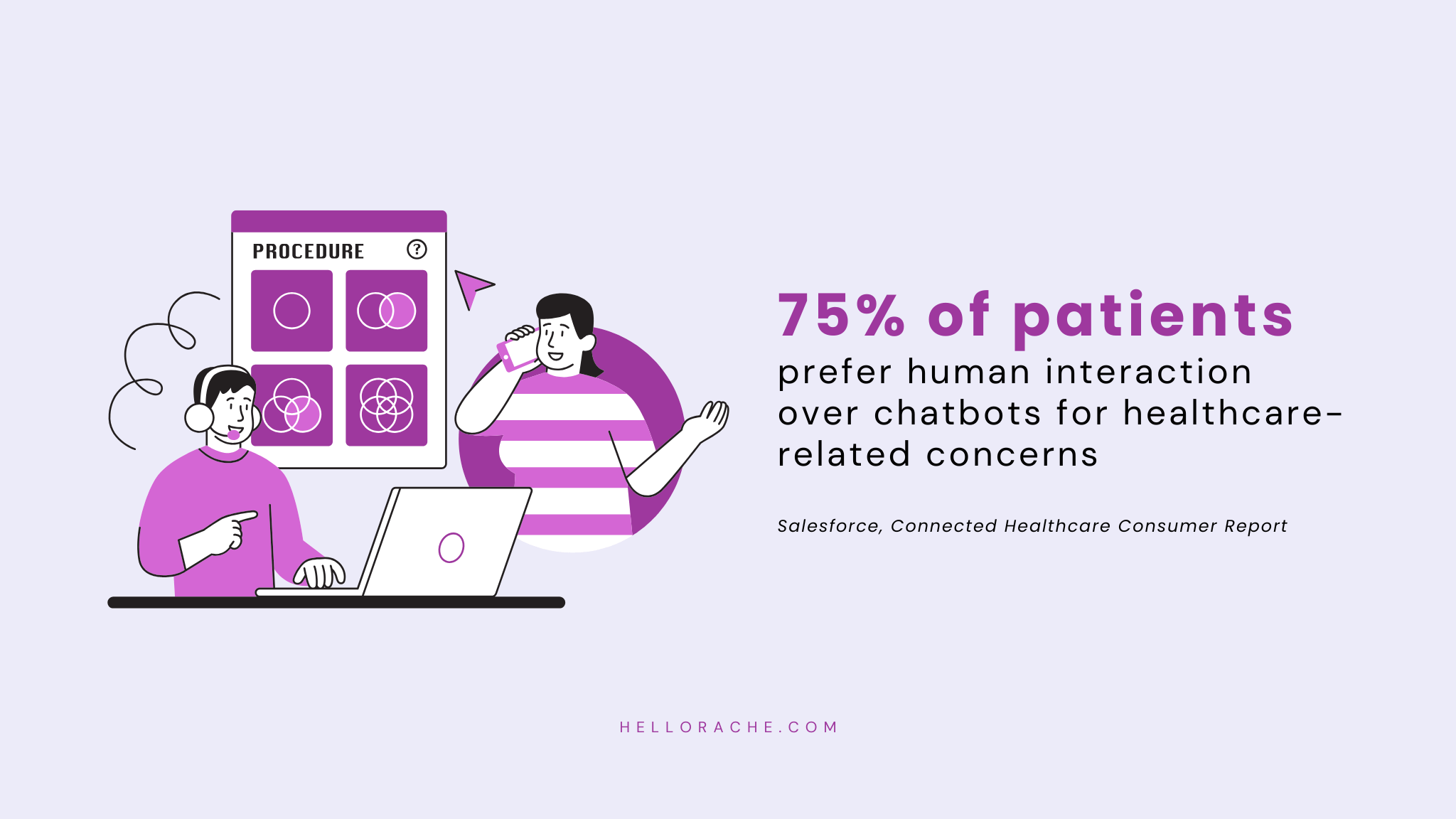
What’s the Appeal of Chatbots?
Practices could easily delegate all of the above responsibilities to an in-house assistant, but this comes with a number of drawbacks. A chatbot, however, offers a number of benefits which an in-house assistant simply can’t match:
Cost Efficiency
Chatbots significantly reduce the need for full-time staff by automating repetitive and administrative tasks. This minimizes labor costs, allowing businesses to allocate resources more effectively. With fewer human assistants required, companies can save on salaries, training, and overhead expenses.
24/7 Availability
Human assistants require breaks, work in shifts, and have to sleep. A single chatbot, though, can work 24/7 for 365 days of the year. And they won’t complain once. There’s no need to be concerned about fatigue, a chatbot will just keep going and operate at the same level of performance. This constant availability enhances patient satisfaction by providing immediate assistance.
Consistency and Speed
Chatbots deliver prompt and easy to understand responses to patient queries, maintaining a consistent tone and accuracy. Human assistants, on the other hand, may vary in speed and struggle to provide a standardized service. Accordingly, a chatbot’s rapid processing capabilities reduce wait times, ensure patients receive quick, accurate answers, and boost overall efficiency.
Scalability
AI-powered systems can manage thousands of patient interactions simultaneously without compromising quality. This scalability makes them the perfect solution for handling peak-season traffic or sudden surges in inquiries. Practices can expand their support capacity effortlessly, without needing to hire or train additional staff members.
Chatbots: What are their Limitations?
The chatbots vs human virtual assistants debate is complex, but there are certain limitations related to chatbots which never arise with human virtual assistants. Certainly, chatbots have a place in healthcare, yet they’re far from suitable for tasks which require complex and sensitive thinking. Hello Rache has identified the following key limitations of chatbots in healthcare:
A Lack of Humanity
Healthcare is always human-centric, with the patient at the forefront of a healthcare team who can offer empathy, reassurance, and personalized attention. Chatbots, by their design, lack anything remotely approaching emotional intelligence. Sure, they can add a layer of sentiment to their responses, but they still feel robotic. For example, a patient sharing concerns may receive a templated response from a chatbot. But a human virtual assistant can offer genuine empathy and real-time emotional support.
Limited Problem Solving Skills
Chatbots run within a set of predefined parameters, so are unable to think outside the box. This means they’re limited in the solutions they can provide. As they typically follow scripts, they will always struggle with unexpected and new scenarios. Imagine you have a patient with a complex billing issue - a chatbot will only be able to offer generic advice, but a human virtual assistant can investigate, contact relevant departments, and provide a problem-specific solution.
Unable to Handle Complex Interactions
It’s well known that chatbots struggle with the nuances of human language and complex queries. These misinterpretations, and the irrelevant responses they produce, can quickly lead to patient frustration. A real-world example is Klarna’s AI customer service failure in 2024. The fintech company laid off two-thirds of its human support staff and replacing them with AI chatbots. Customer complaints about poor service skyrocketed. The result? Klarna had to rehire human assistants to restore service quality.
Data Privacy and Security
All healthcare data is highly sensitive, and ensuring its privacy is paramount for all healthcare providers. Unfortunately, chatbots are vulnerable to security risks, such as data breaches and unauthorized access. Even with encryption and compliance protocols, a chatbot lacks the human intuition that something about an online interaction feels suspicious. Therefore, the potential for patient information to be compromised is high when chatbots are involved.
Inconsistent Accuracy
When it comes to the chatbots vs human virtual assistants question, you have to remember that humans don’t rely on an algorithm. This means chatbots are often unreliable in providing up-to-date information. So, a chatbot offering medication advice may rely on outdated dosage guidelines, potentially leading to harmful consequences. In contrast, a human virtual assistant can verify this advice with a healthcare professional, ensuring more reliable and accurate patient support.
Why are Human Virtual Assistants Better?
Human virtual assistants offer flexibility, adaptability, and compassion on a level that no chatbot can match. In the chatbots vs human virtual assistants battle, human virtual assistants remain the superior choice for supporting healthcare services. Evidence of this enhanced service can be clearly observed in the following areas:
Personalized Patient Engagement
Human virtual assistants can provide a tailored, empathetic service, one where rapport is gradually built with patients over time. This continuity of care ensures that patients feel more comfortable, with less anxieties bubbling to the surface. For example, a chronic pain patient will benefit from regularly engaging with the same virtual assistant who will be familiar with their medical history, preferred communication style, and specific needs.
Problem Solving
Healthcare is full of unpredictable situations where quick thinking and creative problem solving is crucial. But a chatbot is unable to do little more in these situations than refer to a standardized list of FAQs. Thankfully, a human virtual assistant can perform much better here. They can detect nuances in a patients query, recognize red flags, and escalate the case to an appropriate clinician where necessary.
HIPAA Compliance
HIPAA regulations are paramount in protecting patients and their data, so this is where human virtual assistants are indispensable compared to a chatbot. Healthcare virtual assistants come fully trained in HIPAA regulations, ensuring patient data is professionally handled and with an emphasis on confidentiality. Chatbots, however, don’t understand the nuances and importance of HIPAA compliance and are at risk of mishandling sensitive information.
Administrative Expertise
Human virtual assistants bring an unparalleled level of experience to the table when it comes to healthcare administration. They can handle multiple administrative functions, often at the same time, providing seamless service. And this real-world experience guarantees that their employers can rest assured each and every duty will be completed correctly.
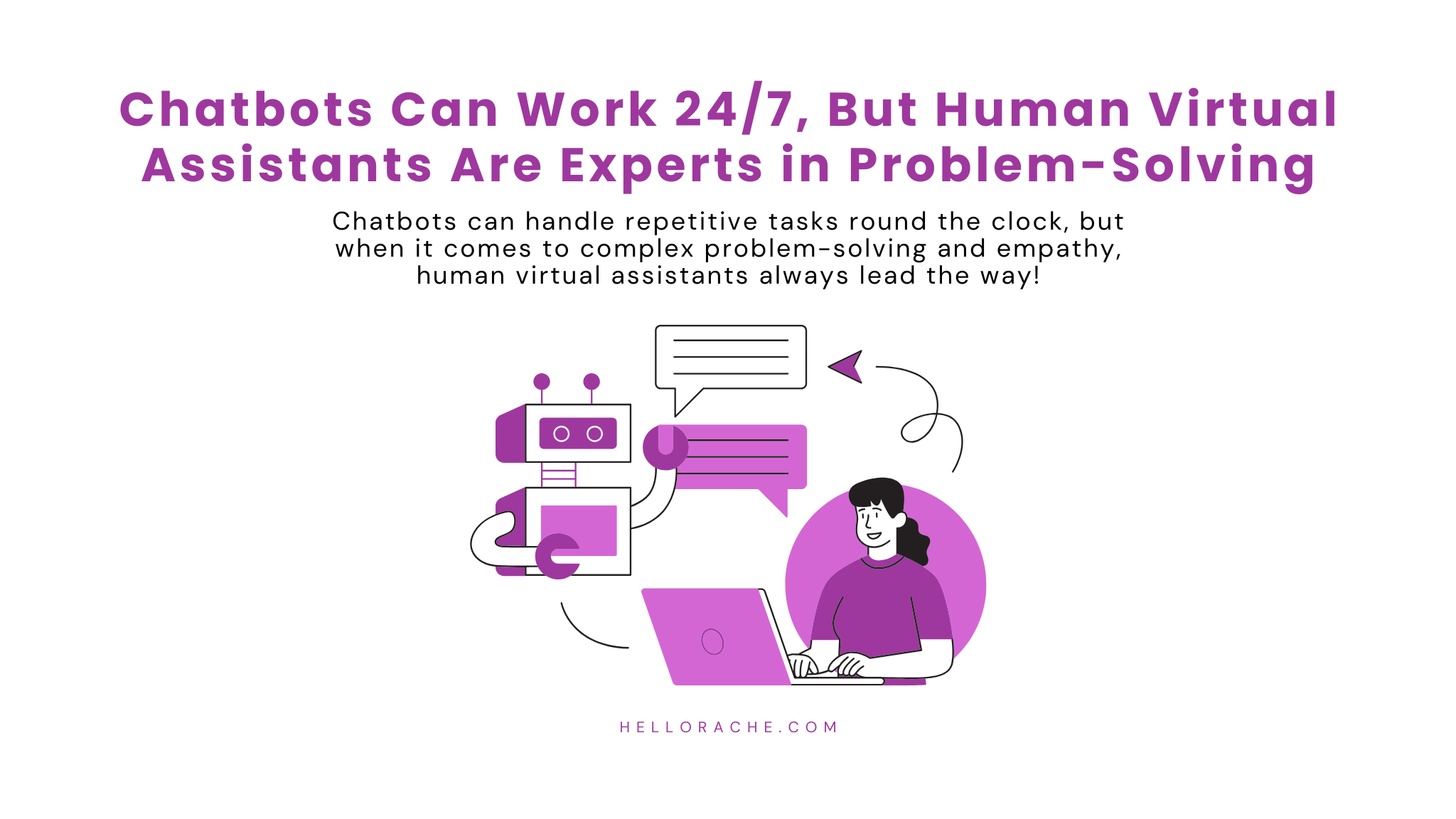
Where Do Human Virtual Assistants Outperform Chatbots?
There are several scenarios where human virtual assistants clearly outperform chatbots, and these scenarios often involve complex or high-stakes healthcare interactions:
During Medical Emergencies
In medical emergencies, quick and accurate decision-making is essential - something which chatbots cannot guarantee. A chatbot, limited by its pre-programmed script, may ask generic triage questions or provide standard symptom management advice, all while failing to grasp the emotional gravity of the situation. A human virtual assistant, however, will instantly recognize the urgency and be able to instruct the patient to call 911 or escalate their call to a clinician.
Complex Inquiries
When patients contact a practice with multi-layered or emotionally sensitive questions, human virtual assistants can tailor their responses to be unique, adaptive, and compassionate. A chatbot, on the other hand, will always be limited by the scripted responses they’re programmed with, and these will fail to fit every situation – leading to irrelevant information being provided. Therefore, a human virtual assistant will provide a far more satisfactory experience.
Can You Have the Best of Both Worlds?
It doesn’t necessarily have to come down to chatbots vs human virtual assistants – instead, you can incorporate both of them into your service. Yes, human virtual assistants provide superior care quality, but AI can still play a valuable role as a support tool. Two of the most effective ways to combine them together are:
AI for Routine Tasks, Virtual Assistants for Complex Care
Chatbots are perfect for handling basic inquiries such as appointment scheduling and simple triage. Employing them here frees up human virtual assistants and your in-house staff to focus on more complex tasks. This approach will enhance efficiency without sacrificing quality.
Automated Data Collection with Human Quality Checking
AI can automate data entry and form processing tasks, saving your virtual assistants and in-house staff from tedious, time-consuming tasks. However, human virtual assistants should still be on hand to verify and oversee the information. This ensures accuracy and prevents errors that could impact patient care.
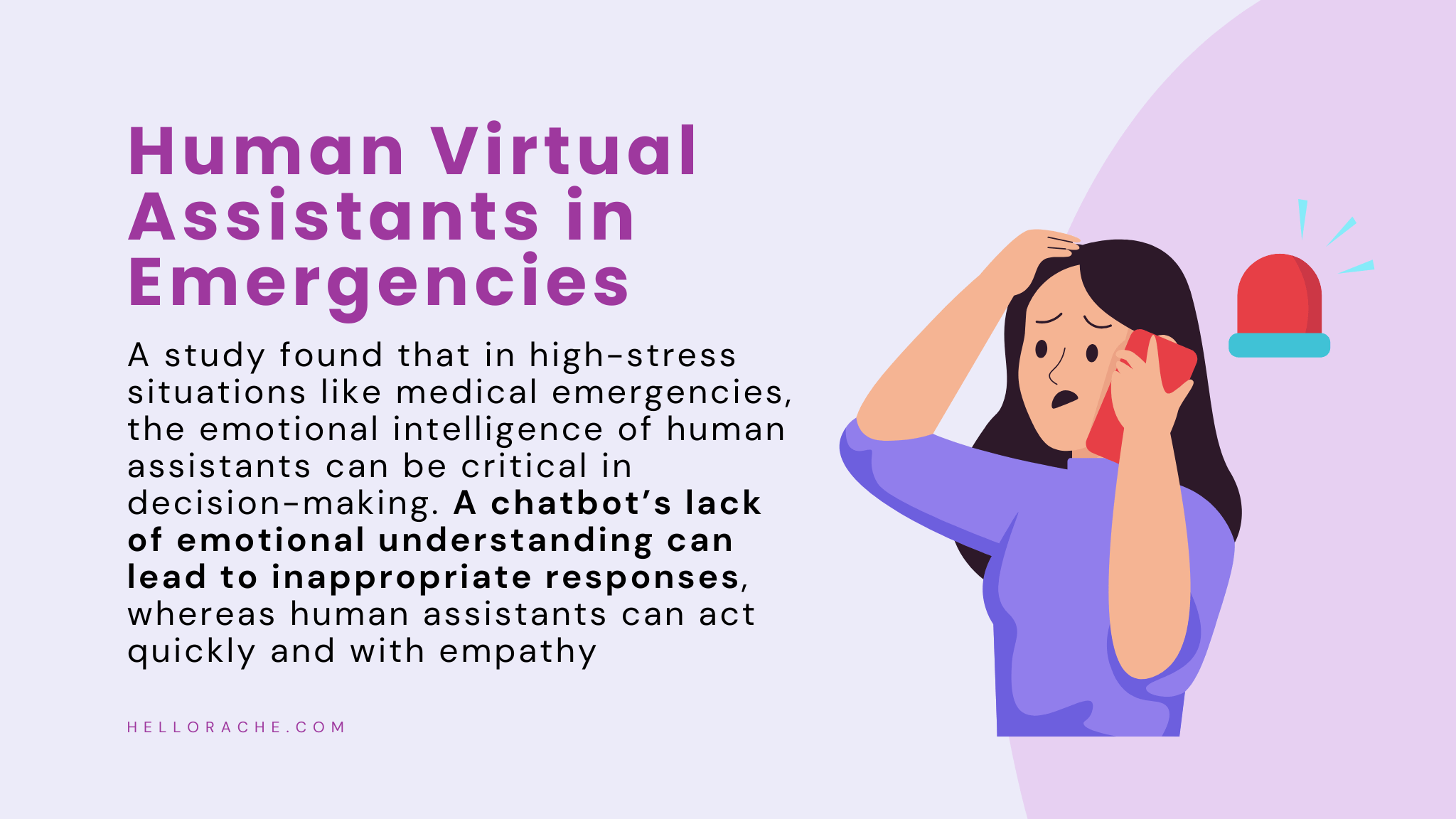
Hello Rache Has You Covered
It’s no surprise that human creativity and ingenuity is more powerful and effective than pre-programmed chatbots. Accordingly, bringing human virtual assistants into your healthcare practice is one of the most revolutionary steps you can take in 2025. But how do you hire a virtual assistant? Simple: you connect with Hello Rache.
Our years of experience in the virtual assistant industry, combined with our unbeatable flat-rate pricing of just $9.50 per hour, enables us to offer you best-in-class virtual assistants. These professionals can transform your service, enhance efficiency, and take your patient care to new heights.
Ready to elevate your patient care with virtual assistant expertise? Discover how you can streamline your practice and give your patients the attention they deserve. Click here to get started!
Discover what Hello Rache can do for you and your practice
Tell us a little about your practice & we will contact you within 24 hours.

